Federally Supported Community Testing Sites Due to Expire June 30
Cases continue to climb, and regionally, COVID-19-related hospitalizations are above 1,000 for the first time. With that as the backdrop, federally-supported community testing sites are due to expire at the end of the month. We have this and more in today’s bullet points:
- Federally supported community testing sites due to expire June 30;
- Dallas County reports 445 new cases, seven deaths;
- Schools still without state guidance on reopening;
- Abbott expands local control on outdoor gatherings, issues new standards for day cares.
Federally Supported Community Testing Sites Due to Expire June 30

After getting a reprieve earlier, the June 30 date that the federal support for two community testing sites is set to expire is looming large, even as Dallas County topped out at 445 new cases of the novel coronavirus Tuesday.
Those who have gone to the sites – located at Ellis Field House and the American Airlines Center – report long waits for testing now. The sites started with 250 tests per day each in March, and now have the capacity for 1,000 per day each.
“As of right now we have not heard that it will be extended,” said Lauren Trimble, chief of staff for Dallas County Judge Clay Jenkins. “The City of Dallas and Dallas County are prepared to step in and utilize CARES funds to continue this important service.”
The Department of Health and Human Services said it was not pulling support for the testing, telling Fox 4’s Allison Harris that it plans to expand in other venues, like pharmacies.
“We are transitioning 13 sites from the original, now-antiquated program to the more efficient and effective testing sites,” the DHHS told Harris.
At least two lawmakers said they will be working to make sure the county continues to get the testing support it needs.
“Testing is critical to beating this virus. It must be easily accessible to everyone, but the lack of a national strategy from the Administration has left North Texas without necessary resources. It’s why Rep. Eddie Bernice Johnson and I fought hard to protect the sites in Dallas,” said U.S. Rep. Colin Allred. “Moving forward, I will do everything I can to support county and city leaders so we can ensure our community has the testing we need.”
When reached for comment, Sen. Ted Cruz’s office also said the deadline should be extended for the community testing sites.
“As Sen. Cruz has said, testing is crucial to protecting the public health and helping our economy get back on its feet. Thankfully, Texas has seen a significant improvement in testing since February – but we know more work must be done,” a spokesperson for Cruz said. “Our fight against this disease isn’t over and testing will remain a crucial component as we work to reopen the economy and ultimately defeat this disease. That’s why Sen. Cruz has urged and will continue to urge HHS and FEMA to extend the community testing sites in Texas.”
Cruz has also introduced legislation that would encourage employers to test their employees for the novel coronavirus, and also introduced a “Right to Test Act” he says will better help ensure states have adequate supplies of tests.
But Jenkins sees an opportunity to potentially be more efficient than current efforts by the federal government – provided he can get the cooperation of the federal government to obtain the kits and reagents needed to process the tests.
“The county is now working with the state and federal government to get the materials directly so they can begin processing locally at Parkland and UT Southwestern, which could cut turnaround down from three to five days to one,” D Magazine’s Matt Goodman wrote.
“Our hope is that we can strike a deal with them to where we use our own vendors but have their support and keep those testing numbers up,” Jenkins told Goodman. “We’re asking the feds to support us with reagents and kits so we can run these tests at our own labs faster than they’re being run at the federal labs. So we’re working on that. Nothing to announce yet.”
Parkland and UT Southwestern have the ability to process more than 6,700 tests each day, provided they have the materials.
Also at play, Goodman reports, is that when school is back in session in August, Ellis Davis will be unavailable, and the American Airlines Center will likely be unavailable as well soon.
Dallas County Reports 445 New Cases, 7 Deaths
Dallas County health officials reported an additional 445 new positive cases of COVID-19, bringing the total case count to 17,744. Seven additional deaths were reported, bringing the death toll to 324.
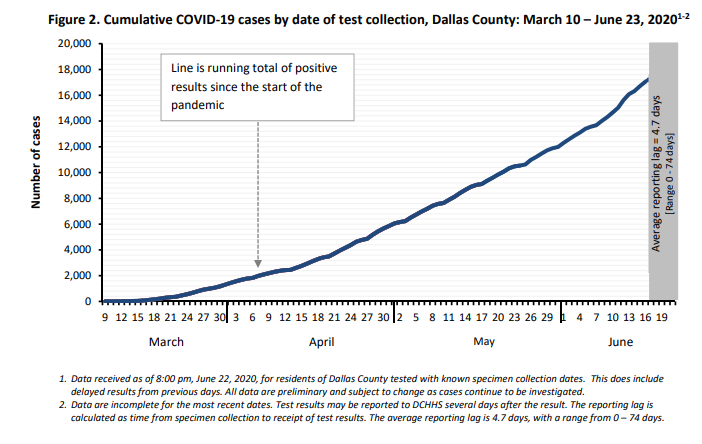
Among the dead are an Irving man in his 40s with underlying health conditions, an Irving man in his 50s with underlying health conditions, a Dallas man in his 60s with underlying health conditions, and a Dallas man in his 80s.
Additionally, a Dallas man in his 60s with no underlying health conditions was found dead at his home, and two residents of long-term care facilities – a woman in her 60s who was a resident of a Dallas facility and a man in his 80s who lived at a Mesquite facility – also died. Of the 324 total deaths reported to date, over a third have been associated with long-term care facilities.
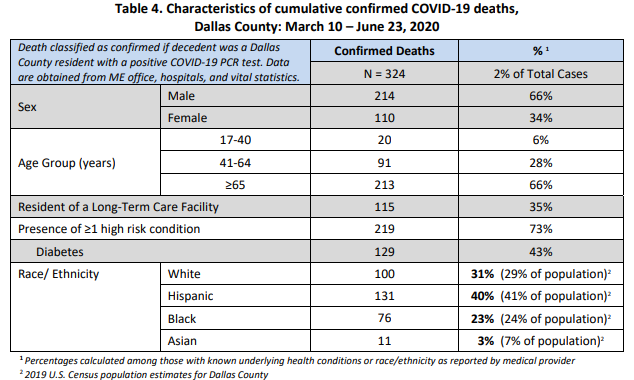
“Today’s numbers continue all-time highs. In the region, we are above 1,000 COVID-19 hospitalizations for the first time, and in Dallas County, we are experiencing our highest COVID-19 hospitalizations thus far,” Jenkins said. “Additionally, our number of new cases at 445, is 225 cases higher than it was on June 1. We are seeing a second wave of COVID-19 cases and I was hopeful that the State would see fit to make some of the recommendations in the Open Texas document requirements.
“Although, the only requirement is the masking requirement passed by Dallas County and other counties, you should follow the advice of the CDC and the local health doctors as if they were state requirements. This is the best way to protect yourself and others from this wave of COVID-19 that we are seeing.”
The county said that the average number of COVID-19 hospitalizations had been hovering somewhere between 300-350 for several weeks, but that the county has now seen an increase to 470 cases in hospitals as of June 22. Emergency room visits for COVID-19-like symptoms also continued to increase, representing about 26% of all ER visits, according to information reported to the North Central Texas Trauma Regional Advisory Council.
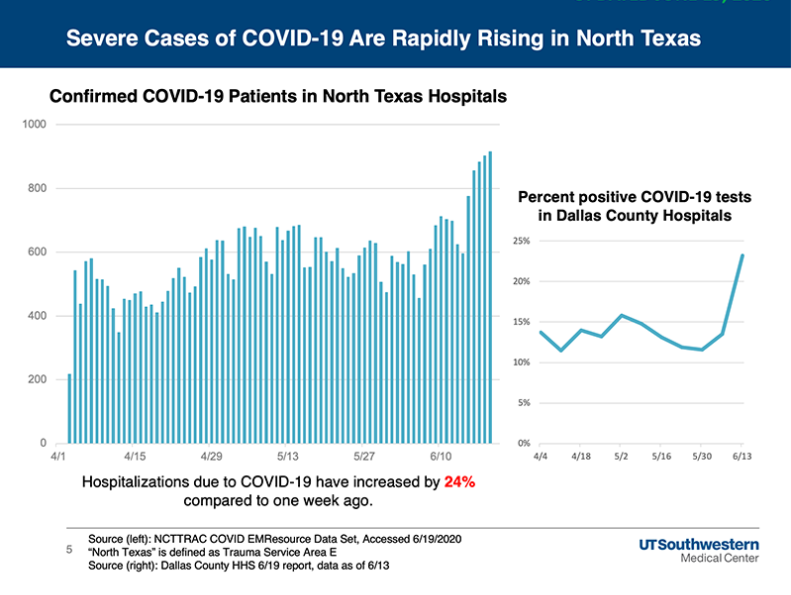
Of cases requiring hospitalization, more than two-thirds have been under 65 years of age, and about half do not have high-risk chronic health conditions. Diabetes has been an underlying high-risk health condition reported in about a third of all hospitalized patients with COVID-19.
About 83% of all hospitalizations are essential workers, with 17% of those essential workers falling in the food and agriculture sector, which includes grocery stores (25 cases), restaurants (49 cases), and food processing and supply chain workers (51 cases).
Dallas Mayor Eric Johnson said that 25 Dallas hospitals reported their bed availability Sunday. Of the 6,083 total beds, 66% were occupied. Of the 942 ICU beds available, 69% were occupied. There were 960 ventilators available, with 347 in use.
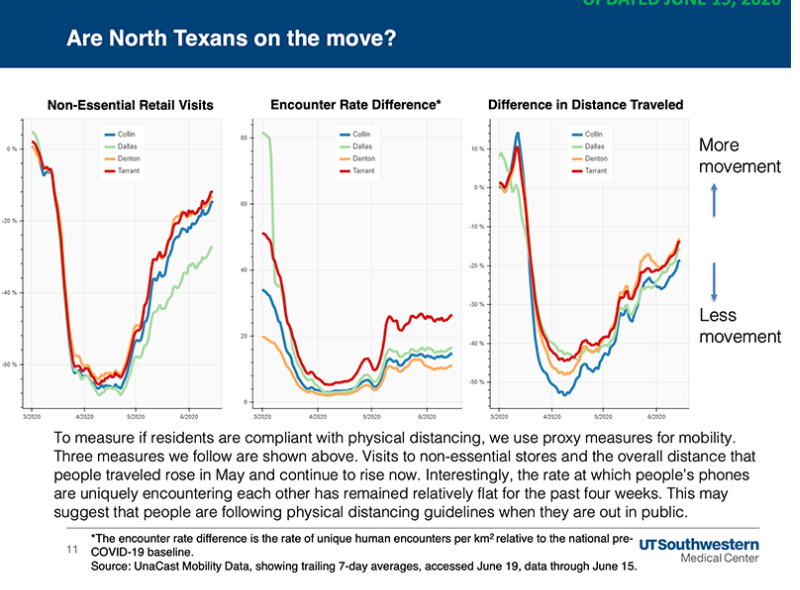
UT Southwestern’s latest forecast projects an increase of roughly 20% in hospitalizations over the next two weeks. By June 22, Dallas County hospitals could see concurrent hospitalizations from COVID-19 increase to 440-560 cases, the forecast said.
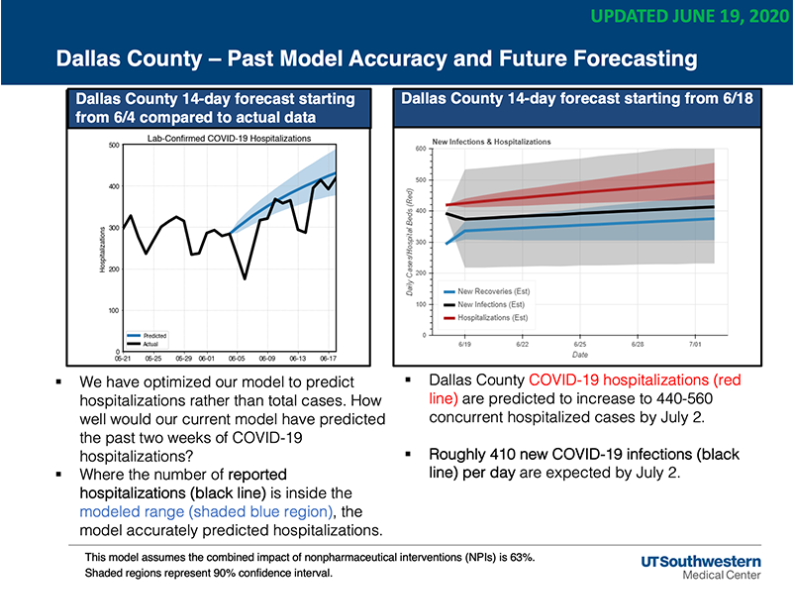
It also predicted that cases would average 410 per day by July 2.
In the county’s June 23 aggregate report, most cases continue to be between the ages of 18 and 60, with the 18-40 age group accounting for 43% of the cases, and the 41-64 age group accounting for another 37% of the total cases.

Close contact or community transmission continues to be the biggest risk factor for contracting COVID-19, accounting for roughly 90.1% of all cases. Living in a long-term care facility, being incarcerated in the county jail, and working in a meat or food processing plant are a distant second, third, and fourth, at 3.4%, 2.9%, and 1.7%, respectively.
Of the testing done, positive cases accounted for 23.2% as of June 13, with 919 positives coming from 3,953 tests. This number increased since June 6’s 13.5% positive rate, but there was also a substantial increase in tests performed, too. Testing and positive test results for COVID-19 far outpaces any other respiratory virus – even if you combine them all.
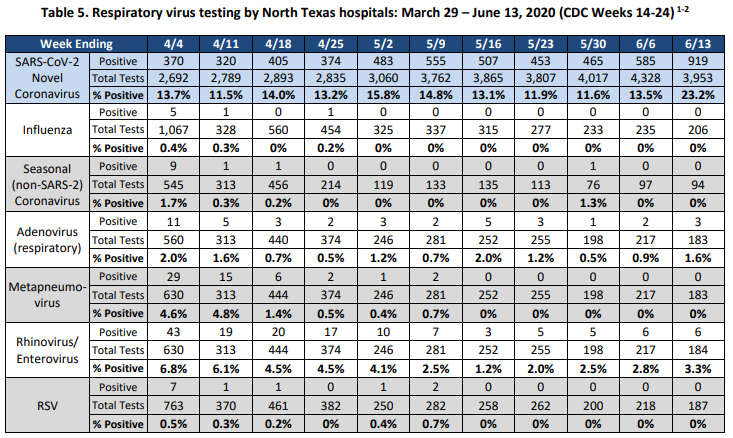
Thirteen percent of all cases ended up hospitalized – 28% ended up in intensive care, and 16% ended up on a ventilator.
In a city-by-city breakdown, Dallas still comes in with the highest number of cases – 9,944, or 56%. Highland Park has 21 cases so far, and University Park has 34.
Statewide, 1,597,290 tests have been administered, with 120,370 testing positive in 242 counties, and 2,220 deaths so far.
Schools Still Without State Guidance on Reopening

As we reported last week, the Texas Education Agency was due to provide further guidance to school districts about the reopening of schools in August.
But on Tuesday, the time for a scheduled press briefing came and went, and in a phone call to superintendents, TEA Commissioner Mike Morath said the agency was not ready to roll out guidance.
“We are unable to give final guidance today on on-campus instruction. We are actively monitoring the situation, and we will try to get out final information as quickly as possible,” Morath told superintendents.
Draft documents inadvertently left in a staging area of the TEA website revealed that so far, it will be up to students and parents to self-monitor and self-report, and leaving implementation of any rules and restrictions to local officials.
“These are draft documents. They were posted in the staging portion of the TEA website by mistake as part of an internal document review,” the agency said in a statement to the Texas Tribune. “As we continue to closely monitor the public health situation, we are, in fact, still soliciting feedback on this guidance. No final decisions have yet been made. Additional guidance will be provided soon.”
The draft documents are low on mandates for districts, other than requiring them to keep students showing COVID-19 symptoms separate from the rest of the student population until a parent can pick them up, and having districts publicly post summaries of their prevention plans. The plans themselves are not subject to TEA approval.
However, lesson plans for distance learning (depending on the method of delivery) are required to get state approval.
We will have more on what school could look like in August as districts – and the state – share their plans. To see the draft documents, click here and here.
Abbott Expands Local Control on Outdoor Gatherings, Issues New Standards for Day Cares
With the Fourth of July rapidly approaching, Gov. Greg Abbott Tuesday issued orders to expand local control regarding large gatherings.
Abbott’s proclamation expanded the ability of mayors and county judges to impose restrictions on outdoor gatherings of more than 100 people.
Abbott said he also directed the Texas Health and Human Services Commission to enact emergency rules that provide strict health and safety standards and procedures related to COVID-19 for child care centers in Texas.
“These two actions are based on data showing an increase in COVID-19 transmission stemming from large gatherings and child care centers,” the governor’s office said.
“These are just some of the steps Texas will take to contain the rise in COVID-19 cases and hospitalizations,” Abbott said. “Today’s proclamation and emergency rules will aid in that effort in two key ways: allowing restrictions on large gatherings where COVID-19 is easily spread and implementing a statewide standard of infection control for child care centers.
“However, as we face this challenge, there is no substitute for personal responsibility. I urge all Texans to do everything in their power to reduce the transmission of the coronavirus by wearing a face mask, washing their hands often, and staying six-feet apart from others.”






